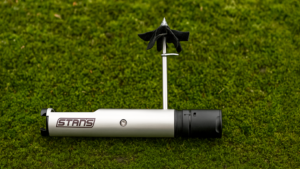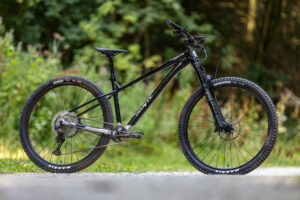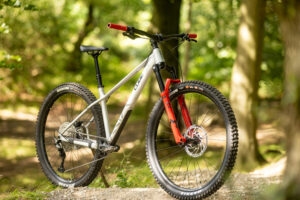The Scott Genius impressed us with its turn of speed. It’s light, fast, reactive and capable.
Scott Genius 920 review

Trail Bike of the Year in association with Alpinestars
The Scott Genius 920 is definitely a contender If you’re into shredding singletrack, big rides and climbing. It’s efficient but it’s also a lot of fun.
>>> Trail Bike of the Year 2020
The Scott Spark was the bike that ignited the trajectory that Scott’s current full-suspension range follows; starting a chain reaction that transformed the Genius, revived the Ransom, and culminated in the new Gambler downhill race bike.
But it is not simply suspension layout that unites all four platforms. All have progressive geometry, all come loaded with proprietary tech, and all push the limits of weight saving. It should come as no surprise then, that, at 13.29kg, the 150mm travel Scott Genius 920 is the lightest bike in test, almost 2kg lighter than the Nukeproof Reactor 290c Elite.
Scott Genius review
The HMF carbon front end saves 515g over the full alloy version we tested last year, and while we’d argue that you can feel the extra stiffness the carbon provides, especially under power, Scott has retained some flex in the frame, so the Genius still finds traction on wet, off-camber roots, when other bikes falter.
Yes, the upside-down shock looks a little odd, but there’s method to Scott’s madness; the inverted design placing the widest part of the trunnion mount Fox Nude shock in the broadest portion of the frame. Additionally, it offers the most direct cable routing for the Scott TwinLoc remote, while allowing for a much narrower and neater rocker link.
The alloy rear end on the 920 is equally sleek, but the quick-release lever snags on the weld that joins the non-driveside dropout to the seatstay. Fortunately, the lever is removable, and doubles as a T40 Torx key, that fits all of the pivot hardware. Which is handy, as we found two bolts that needed tightening straight out of the box.
Suspension
The Genius is the only bike with Fox suspension in this test not to get a 36 suspension fork. By sticking with the slender 34, Scott has saved approximately 200g in weight, which obviously helps make it the lightest bike in test. But given that is also has the slackest head angle, a 36 would probably be more appropriate.
Now for the tech part. Scott’s TwinLoc lever is connected to the fork and shock. It is positioned neatly under the bar and it functions in a similar way to a front derailleur shifter. Remember those? In Descend mode the Genius delivers 150mm travel front and rear. One click of the TwinLoc lever initiates Traction-Control, which closes a portion of the air chamber to reduce sag and limit travel to 100mm, while simultaneously increasing the damping in both the fork and shock. One click further and the fork and shock lock out. And as if that weren’t enough suspension tech for one bike, the shock also has Ramp Adjust, a small lever on the air can that changes the progressivity of the spring curve for extra bottom out resistance.
Components
Last year the Genius had a 760mm handlebar and 50mm stem. This year the bar grows to 800mm with the grips fitted, while the stem gets chipped back to 45mm. Both positive changes. One obvious discrepancy in the specification is that Scott states the bike should have a more aggressive Maxxis Dissident front tyre, but our test bike came with 2.6in Rekons front and rear.
Performance
Even in the low setting, the Genius has a relatively high 344mm BB height, so switching to our smaller volume control tyres not only improved traction and control over the shallow tread Rekons, they also lowered the BB height by 3mm too. With proper tyres fitted, the Genius is an absolute ripper. The combination of the slack head angle, buttery smooth suspension response and some flex in the chassis means you can ride this bike really hard on rough terrain. Pedalling efficiency is first rate too, and when it’s mushy out, switching to Traction mode on the climbs really stops the bike getting bogged down under power. Granted, the increase in fork damping means it rides higher at the front, which actually makes the Traction mode slightly less effective at propping up the rear suspension. So, if anyone at Scott is reading this, can we just have a SingleLoc remote for the rear please?

Verdict
It’s clear that the Scott Genius 920 doesn’t quite tick all the modern trail bike boxes. Testing bikes isn’t simply an exercise in box ticking however. From the very first pedal stroke, the 150mm travel Genius impressed us with its turn of speed. It’s light, fast, reactive and capable, the TwinLoc remote allowing for a plusher suspension response without compromising climbing efficiency. Yes, it’s easy to mock the web of cabling and the spindly Fox 34 fork, but in doing so you’ll underestimate a great trail bike.















